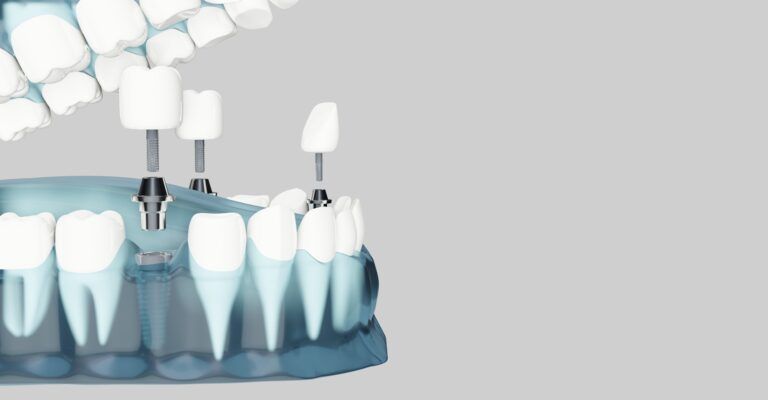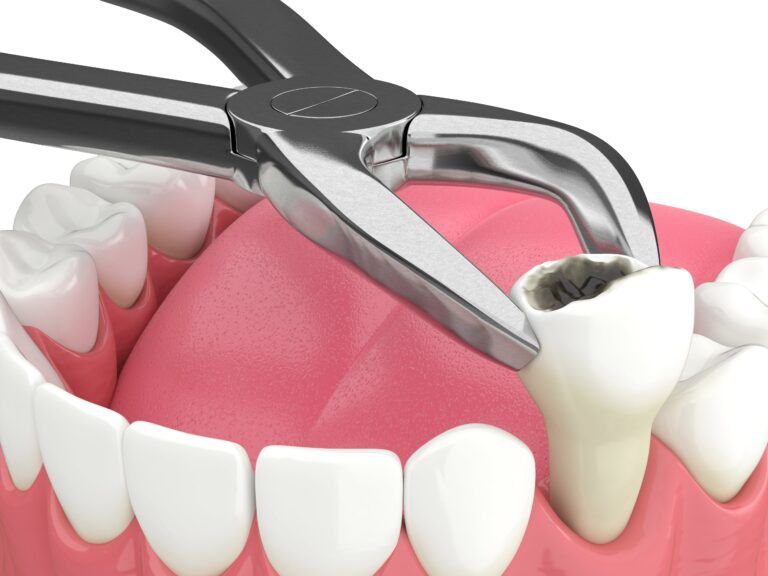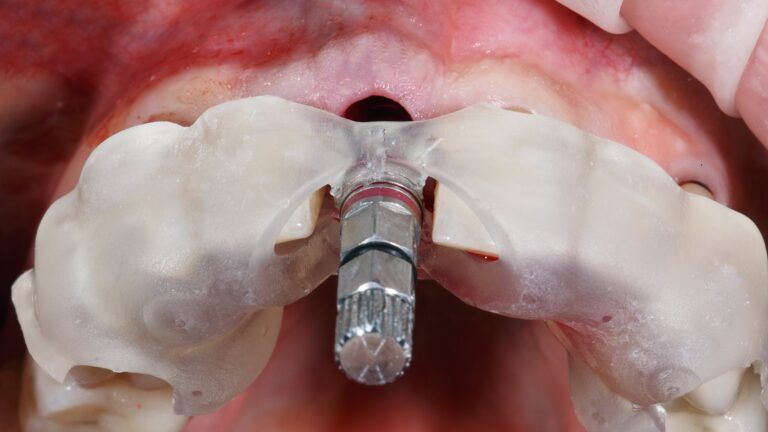When it comes to replacing missing teeth, dental implants have become an increasingly popular option over traditional dentures. Unlike dentures, dental implants are designed to mimic the look and function of natural teeth, providing a permanent and durable solution that can improve oral health, appearance, and overall quality of life. In this article, we will evaluate both dental implants and traditional dentures, as well as discuss seven reasons why you may want to choose dental implants over traditional dentures. From improved function and appearance to increased comfort and convenience, these benefits demonstrate why dental implants are a preferred choice for many individuals seeking to restore their smiles.

What are dental implants?
Dental implants are artificial tooth roots that are surgically placed into the jawbone to support a replacement tooth or bridge. The implants are typically made of titanium, which is a biocompatible material that is accepted by the body. Once the implant is placed into the jawbone, it fuses with the bone over time through a process called osseointegration, creating a stable and secure foundation for a dental restoration. This restoration can be a single crown, bridge, or even a complete set of dentures. Dental implants are designed to look, feel, and function like natural teeth, providing a long-lasting solution for missing teeth that can improve oral health, appearance, and overall quality of life.
What are traditional dentures?

Traditional dentures are removable dental appliances that replace missing teeth and surrounding tissues. They are typically made of acrylic resin and are custom-fitted to the individual’s mouth. Dentures can be used to replace a full arch of teeth (complete dentures) or just a few missing teeth (partial dentures).
Traditional dentures rely on suction and/or adhesive to stay in place, and must be removed and cleaned daily. They can sometimes slip or move around in the mouth, which can cause discomfort, embarrassment, and difficulty speaking or eating. While dentures can be a cost-effective option for replacing missing teeth, they do not offer the same level of stability, function, and aesthetics as dental implants, which are a permanent solution that is surgically placed into the jawbone.
How They Compare
Here’s a table comparing dental implants to traditional dentures:
| Feature | Dental Implants | Traditional Dentures |
| Type of Restoration | Fixed, permanent restoration that is surgically placed into the jawbone | Removable dental appliance that rests on the gums |
| Function | Function much like natural teeth, providing a stable and secure foundation for eating and speaking | Can slip or move around, making it difficult to eat and speak comfortably |
| Aesthetics | Look and feel like natural teeth, providing a more attractive smile and facial structure | May appear less natural, especially if they move around in the mouth |
| Durability | Designed to last for many years with proper care | May need to be replaced every few years |
| Maintenance | Require regular oral hygiene care, such as brushing and flossing, but do not need to be removed for cleaning | Must be removed and cleaned daily |
| Comfort | Custom-fitted to the individual’s mouth, providing a more comfortable fit | May cause discomfort or soreness in the gums or mouth |
| Bone Health | Stimulate the jawbone to prevent bone loss and preserve oral health | Do not provide stimulation to the jawbone, which can lead to bone loss over time |
| Cost | More expensive upfront, but may be more cost-effective in the long run due to their durability | Generally more affordable upfront, but may require more frequent replacements over time |
It’s worth noting that the suitability of dental implants versus traditional dentures may vary depending on an individual’s specific oral health needs and circumstances, so it’s important to consult with a dental professional to determine the best option for you.
Why To Consider Dental Implants Over Traditional Dentures
When deciding between these two options, dental implants are generally considered to be the gold standard of tooth replacement options. There are many reasons why dental implants are preferred over traditional dentures, including:
Durability

In terms of durability, dental implants are generally considered to be a more durable and long-lasting option compared to traditional dentures. Dental implants are made of high-quality materials, such as titanium, and are designed to be permanent fixtures in the mouth. They are surgically placed into the jawbone and fuse with the bone over time, creating a stable and secure foundation for a dental restoration. With proper care, dental implants can last for many years, even decades.
On the other hand, traditional dentures are made of materials such as acrylic resin and are not designed to be permanent fixtures in the mouth. They may need to be replaced every few years due to normal wear and tear or changes in the shape of the gums or jawbone. While dentures can be a cost-effective option for replacing missing teeth, they may not last as long as dental implants and may require more frequent replacements over time.
Functionality
In terms of function, dental implants are generally considered to be superior to traditional dentures. Dental implants function much like natural teeth, providing a stable and secure foundation for eating and speaking. Because they are anchored to the jawbone, dental implants can handle a wide range of food textures and can allow the individual to eat and speak with confidence, without worrying about slippage or discomfort. In contrast, traditional dentures may slip or move around in the mouth, which can make it difficult to eat and speak comfortably. They can also be bulky and may interfere with speech or cause discomfort or soreness in the gums or mouth. Moreover, dental implants offer several functional advantages over traditional dentures. They can help preserve the jawbone by providing stimulation, which can prevent bone loss and maintain oral health. Additionally, dental implants do not require the use of messy adhesives, which can be messy and uncomfortable.
Appearance

In terms of appearance, dental implants are generally considered to be superior to traditional dentures. Dental implants look and feel much like natural teeth, providing a more attractive and natural-looking smile and facial structure. The dental restoration attached to the implant is custom-made to match the color, size, and shape of the adjacent natural teeth, which helps to create a seamless and natural-looking smile. Additionally, dental implants can help maintain the shape of the jawbone and prevent the sunken appearance that can occur with dentures over time. This can contribute to a more youthful and attractive facial structure. In contrast, traditional dentures may appear less natural, especially if they move around in the mouth or do not fit properly. They can also be bulky, which can make them more noticeable and less aesthetically pleasing.
Improved Oral Health
In terms of oral health, dental implants are generally considered to be superior to traditional dentures. Dental implants are anchored directly into the jawbone, which helps to provide stimulation and prevent bone loss. This can help to preserve oral health over time and prevent the sunken appearance that can occur with dentures. Additionally, dental implants can help to improve oral hygiene by making it easier to brush and floss between the teeth and gums. Traditional dentures, on the other hand, can contribute to bone loss and a sunken appearance in the jawbone over time. They may also increase the risk of oral thrush, which is an infection caused by an overgrowth of candida in the mouth.
Convenience
In terms of convenience, dental implants and traditional dentures have some differences. Dental implants are a more permanent solution that requires a longer process to install. However, once placed, they generally do not require adjustments or replacements. They are also easy to care for since they are cleaned and cared for like natural teeth with regular brushing, flossing, and visits to the dentist. With proper care, dental implants can last for many years or even a lifetime. Furthermore, dental implants can provide convenience in terms of eating and speaking, as they offer a stable and secure foundation for these activities. In contrast, traditional dentures may be more convenient initially because they can be made and placed quickly, often in a matter of weeks. However, they require adjustments and replacements as the jawbone changes over time. They also require additional maintenance, such as regular removal and cleaning, and the use of adhesives to keep them in place. In some cases, dentures may need to be relined or replaced entirely due to changes in the jawbone, which can be an inconvenience. They may also slip or move around in the mouth, making eating and speaking more difficult or uncomfortable.
Comfort
In terms of comfort, dental implants are generally considered to be superior to traditional dentures. Dental implants are anchored directly into the jawbone, which provides a stable and secure foundation for the artificial tooth or teeth. This means that they do not move around in the mouth or cause irritation to the gums, which can be uncomfortable. Traditional dentures, on the other hand, can be uncomfortable for some individuals. They may slip or move around in the mouth, causing sore spots or irritation to the gums. They may also put pressure on the gums and jawbone, which can cause discomfort and pain. Additionally, dentures may require the use of adhesives, which can cause additional discomfort.
Improved Quality of Life
Dental implants provide a permanent solution for missing teeth that closely mimics the look, feel, and function of natural teeth. This can lead to a significant improvement in overall quality of life, as dental implants can help to restore confidence, improve speech and eating ability, and enhance overall oral health. Traditional dentures, on the other hand, may be less comfortable, less stable, and less aesthetically pleasing. They can slip, move around, or even fall out, which can be embarrassing and negatively impact a person’s self-esteem. Dentures can also cause sore spots, irritation, and discomfort, making it difficult to eat, speak, or socialize comfortably.
In Conclusion
In conclusion, dental implants are a superior option for individuals who have missing teeth and want to improve their oral health and quality of life. Compared to traditional dentures, dental implants offer a more permanent, durable, and natural-looking solution that provides a stable and secure foundation for the artificial tooth or teeth. Dental implants also require less maintenance and offer greater comfort, convenience, and oral health benefits compared to traditional dentures. Although the process of getting dental implants may take longer and cost more than traditional dentures, the long-term benefits make it a worthwhile investment for many people. A dental professional can help determine if dental implants are the best option based on an individual’s specific oral health needs and circumstances.

Irfan Atcha, DDS, DICOI, DADIA at New Teeth Chicago Dental in Chicago, Illinois is a board-certified general dentist and a nationally recognized expert in dental implants, cosmetic dentistry, and sedation dentistry. Dr. Atcha is now serving patients in Naples, Bonita Springs and SW FL area with All-on-4 implants, teeth-in-a-day, same day dental implants and the complex zygomatic dental implants for the no-jaw bone solution approach. To schedule a consultation please email Dr. Atcha at teethforyou@gmail.com.





